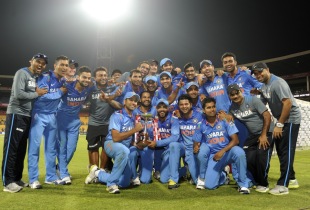India v Australia, 2013-14
Shamya Dasgupta

|
|||
|
Related Links
Match reports : India v Australia, 2013-14
Match reports : India v Australia, 2013-14 Series/Tournaments:
Australia tour of India
|
|||
Twenty20 international (1): India 1, Australia 0 One-day internationals (7): India 3, Australia 2
This tour crept up on everyone. With Australian thoughts preoccupied by the Ashes Part II, and all the hype in India centring on the upcoming Tendulkar Tests against West Indies, a seven-match one-day series seemed like an intrusion. And when it turned into one of the most run-laden encounters of all time, there were serious questions to be asked about its usefulness to both sides ahead of their respective Test series - and about the overwhelming dominance of bat over ball.
Australia had an excuse: they were fielding players who mostly weren't part of their Ashes plans, and Michael Clarke's recurring back problem meant he didn't travel either. With Darren Lehmann staying at home too, Australia were captained and coached by two stand-ins - George Bailey and Steve Rixon. India's personnel, however, tend to overlap in the three formats, and the truth was that, while one-day run-fests boost the coffers, behind-the-scenes preparation for Test cricket does not. And one-dayers in India, with pitches like graveyards for bowlers, offer run-fests in Technicolor.
The solitary Twenty20 international in Rajkot established the pattern, with India overhauling Australia's 201 for seven in the final over. Still, few could have guessed just how much worse it would get for the bowlers. After two games scheduled for eastern India were ruined by Cyclone Phailin, the lowest total in the five completed matches was India's 232 in the opener at Gahunje.
Overall, 11 completed innings (India's reply at Ranchi was interrupted after only 25 deliveries) brought an aggregate of 3,569 runs for 73 wickets - which meant an average total of 324. At Jaipur, Australia racked up 359; India chased it down in 43.3 overs. At Nagpur, India got past Australia's 350. And in the deciding match, Rohit Sharma became the third double-centurion in one-day internationals, and the third by an Indian, as they ran up 383 for six. Even that was under threat for a while. The overall run-rate of 6.64 was the highest for any one-day series.
M. S. Dhoni joked that bowling machines might have been a better bet than human beings, and questioned the new regulations that allowed only four fielders outside the 30-yard circle in non-powerplay overs. But those rules hadn't made for such scores in England during the Champions Trophy. The main factor, it stood to reason, was the pitches.
Mitchell Johnson was, despite bouts of waywardness, the only Australian bowler to leave with his reputation enhanced, after scaring the Indians with his 150kph bolts aimed at the throat. The spin pair of Ravichandran Ashwin and Ravindra Jadeja - the only two frontline Indian bowlers to make it through the series - managed economy-rates of under six, as did Bhuvneshwar Kumar, although he bowled most of his 43 overs at the start with a swinging new ball.
Ishant Sharma was the other bowler who hogged attention - for returning two for 189 from 24 overs, which cost him his place. The final straw came when James Faulkner hit him for 30 in an over to secure an astonishing Australian victory in Mohali.
So dominant were India's top three - with Virat Kohli reaching three figures in 52 balls at Jaipur and 61 at Nagpur - that their middle order barely got a hit. When they did, their returns were underwhelming: Suresh Raina managed 100 runs in four innings, Yuvraj Singh 19 in four, and Jadeja 13 in three. Dhoni was needed more than ever. A rejuvenated Yuvraj had, however, already won the Twenty20 international with a blistering unbeaten 77 in 35 balls.
Through all the leather-chasing, the teams somehow managed to identify personnel for the Test arena. Rohit Sharma's 491 runs were a record for a bilateral one-day series, while Mohammed Shami emerged as a fiery option with the new ball. Bailey also broke the old record, with 478 runs - making a compelling, if not watertight, case to fill Australia's No. 6 Test spot. And Australia saw enough in Johnson's performance to pull him out early for the Ashes; they soon regretted not doing the same for Shane Watson, who aggravated a hamstring in the last game.
Match reports for
Only T20I: India v Australia at Rajkot, Oct 10, 2013
Report |
Scorecard
1st ODI: India v Australia at Pune, Oct 13, 2013
Report |
Scorecard
2nd ODI: India v Australia at Jaipur, Oct 16, 2013
Report |
Scorecard
3rd ODI: India v Australia at Mohali, Oct 19, 2013
Report |
Scorecard
4th ODI: India v Australia at Ranchi, Oct 23, 2013
Report |
Scorecard
5th ODI: India v Australia at Cuttack, Oct 26, 2013
Report |
Scorecard
6th ODI: India v Australia at Nagpur, Oct 30, 2013
Report |
Scorecard
7th ODI: India v Australia at Bengaluru, Nov 2, 2013
Report |
Scorecard

